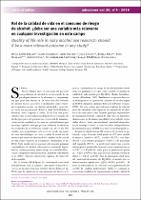Rol de la calidad de vida en el consumo de riesgo de alcohol: ¿debe ser una variable más relevante en cualquier investigación en este campo

View
Author
Date
2018-07-13Permanent link
https://hdl.handle.net/11351/6980DOI
10.20882/adicciones.1098
ISSN
0214-4840
PMID
30059591
Abstract
Using basal data from EFAR-Spain (A randomised controlled non-inferiority trial of primary care-based facilitated access to an alcohol reduction website) we explored the relationship between quality of life (QoL, as evaluated by EQ-5D-5L) and pattern of alcohol use (as evaluated by AUDIT) . Multivariate regression analyses were conducted using total QoL index and QoL six dimensions (anxiety/depression, Visual Analogue Scale (VAS), pain, mobility, self-care, daily activities) as dependent variables and AUDIT score and sociodemographic data as independent variables. Adjusting for sociodemographic data, AUDIT score was a statiscally significant predictor of overall QoL (lineal regression B-0.25 95% CI -0.04 to -0.01), anxiety/depression (logistic regression OR 1.10 95% CI 1.08-1.22) and health VAS (lineal regression B-0.27 95% CI -1.25 to -0.500). Since reducing alcohol intake can be a reasonable and ethically correct therapeutic objective in mild and moderate alcohol use disorders and since alcohol use pattern self-assessment has several limitations, perhaps assessing changes in QoL over time could be useful to monitor our patients recovery.
Keywords
Alcohol; Quality of life; AUDITBibliographic citation
López-Pelayo H, Oliveras C, Segura L, Colom J, Díaz E, Wallace P, et al. Rol de la calidad de vida en el consumo de riesgo de alcohol: ¿debe ser una variable más relevante en cualquier investigación en este campo. Adicciones. 2018 Jul 13;30(4):301-303.
Audience
Professionals
This item appears in following collections
The following license files are associated with this item:

 Private area
Private area Contact Us
Contact Us







